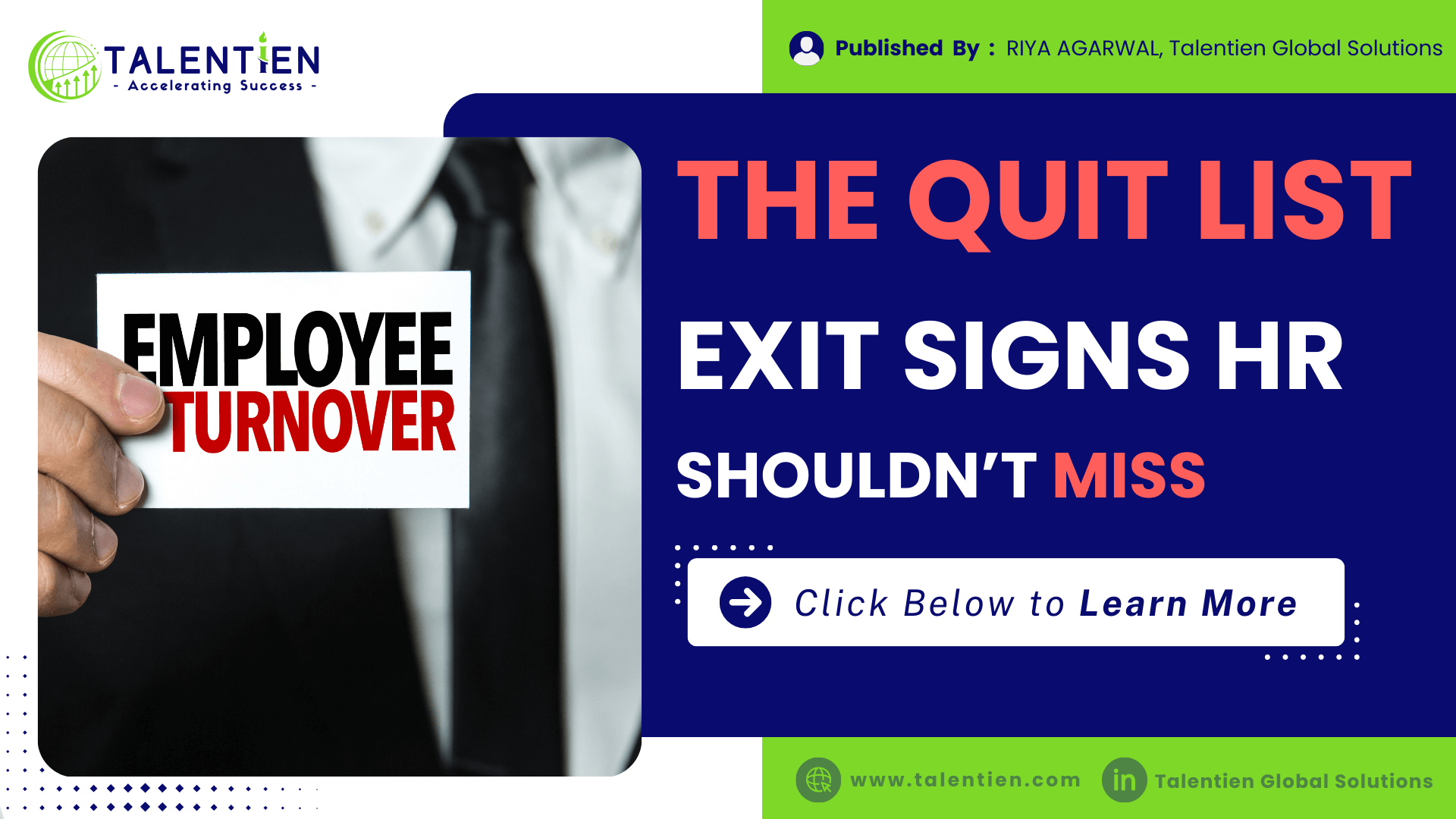Let’s be honest – when someone quits, it rarely comes out of nowhere.
There are signs. Subtle ones at first. Missed deadlines, less engagement, short replies in meetings. Then maybe they start using up all their leave. Or stop turning on their camera. And eventually – boom. Resignation email hits the inbox.
By then, it’s too late.
The reality? Most people don’t leave suddenly. They leave slowly, in stages. And usually, they’ve made the decision weeks before they send that formal notice.
So, why are people still leaving? And what can HR really do to catch it early?
Here’s what’s really going on beneath the surface – and where HR can (and should) step in before the exit door swings open.
Table of Contents
Toggle1. They Don’t See a Future Here
Career growth isn’t just about promotions. It’s about progress. If people feel like they’re stuck in the same place year after year – doing the same tasks, without learning anything new – they start to check out.
And eventually, they check out for real.
What HR can do:
Don’t wait for annual reviews to talk growth. Make development part of monthly 1:1s.
Offer micro-learning opportunities, mentorships, and stretch projects.
Get managers to talk about career paths early, not just when someone threatens to leave.
If people can’t picture a future with you, they’ll go find one somewhere else.
2. They’re Burned Out (and No One Noticed)
Burnout doesn’t always look dramatic. Sometimes it shows up quietly – through disengagement, missed deadlines, or even sarcasm in meetings.
The sad part? Most employees won’t say they’re burning out. They’ll just keep pushing – until they can’t.
What HR can do:
Watch for changes in behavior and energy levels.
Train managers to check in on well-being—not just output.
Normalize real PTO. Actually encourage people to unplug.
Fix broken workflows that force weekend work or 9 pm emails.
Overwork isn’t a badge of honor. It’s a warning sign.
3. They Don’t Feel Heard
Ever seen someone raise an idea in a meeting, only to have it brushed off – or worse, ignored completely?
Over time, that stuff builds up. When people feel like their voice doesn’t matter, they quietly disengage. And eventually? They look for a workplace where it does.
What HR can do:
Push for anonymous feedback loops and open forums.
Train leaders to listen without defending. Sometimes just being heard changes everything.
Celebrate employees who speak up – and actually act on what they share.
When people stop talking, it’s not because they have nothing to say. It’s because they gave up trying.
4. They’re Underpaid – or Think They Are
Compensation is emotional. It’s not just about numbers on paper – it’s about fairness, recognition, and feeling valued.
And the moment someone realizes a friend at another company is making 30% more for the same work? That’s when they start updating their resume.
What HR can do:
Benchmark salaries regularly, especially in fast-moving markets like India’s tech and startup space.
Be transparent about pay ranges and what it takes to move up.
Don’t wait for a counteroffer to give a raise – that’s already a loss.
People don’t always leave because of money. But it’s often the last straw when everything else feels off.
5. Their Manager’s the Problem (Even If You Don’t See It Yet)
Yep, it’s the cliché for a reason. People leave managers, not companies.
A great boss can make even a stressful job feel manageable. A bad one? Can turn a dream role into a daily drain.
What HR can do:
Run regular 360 feedback—not just top-down.
Coach managers, don’t just train them.
Step in early when you sense tension or trust issues.
Protect high performers from toxic leadership dynamics.
If one team has higher turnover than the rest, don’t ignore it. Something’s up.
6. They Feel Like Just a Number
In bigger companies especially, employees can fade into the background. No recognition. No connection to purpose. Just tasks, targets, repeat.
Eventually, that takes a toll.
What HR can do:
Personalize recognition. A public shoutout, a handwritten note, a surprise day off—small things go a long way.
Tie daily work back to big-picture impact. Remind people why their role matters.
Build community through interest groups, learning sessions, team rituals – especially in remote or hybrid settings.
Connection isn’t just social. It’s psychological glue.
7. They’ve Outgrown the Culture
Sometimes, someone leaves not because something went wrong—but because the company stayed the same and they changed.
What excited them two years ago doesn’t feel right anymore. Maybe they want more flexibility. Or more purpose. Or less red tape.
That’s not betrayal. That’s growth.
What HR can do:
Stay curious. Keep asking employees how they’re evolving.
Refresh your EVP (Employer Value Proposition) every 12-18 months—what worked in 2021 won’t cut it in 2025.
Offer internal mobility and re-skilling options before they look elsewhere.
Retention isn’t about chaining people to desks. It’s about giving them reasons to choose you again and again.
Final Thought : Catch the Drift Before the Exit
The best HR leaders don’t just analyze attrition. They listen for disconnection before it turns into departure.
Because the real reason employees leave?
It’s not always dramatic.
It’s often slow.
It’s usually silent.
Your job isn’t to fix everything. But if you’re paying attention – and creating space for people to speak, grow, and be seen – you’ll keep more good people around.
And when you do lose someone? Don’t just file the exit interview and move on.
Ask yourself : What could we have done differently – two months earlier?
That’s where the real retention work starts.




